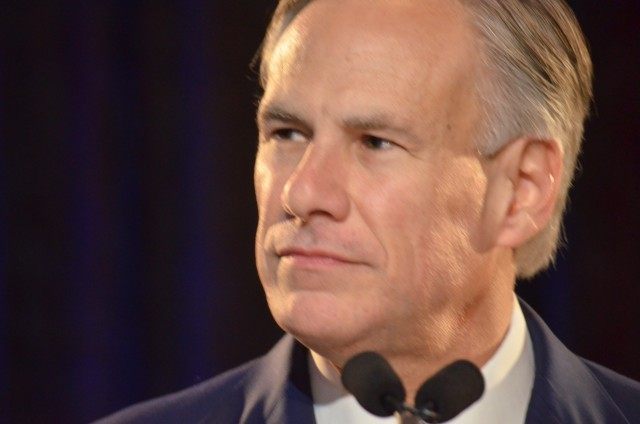Texas Governor Greg Abbott is poised to wield enormous influence in the 2016 Republican presidential primary, if he so chooses. Although he expressed a desire to stay neutral earlier this month, Abbott recently seems to be inching closer to exerting his influence, even if he stops short of making an actual endorsement.
Abbott has connections to many of the current and potential candidates – most obviously his predecessor, former Texas Governor Rick Perry, who will be launching his campaign on June 4th in Dallas, and Sen. Ted Cruz (R-TX), who served as Texas’ Solicitor General while Abbott was Attorney General., Cruz was the first Republican to officially enter the race.
Earlier this month, Abbott told Breitbart Texas that it had “been a privilege to work alongside both Governor Perry and Senator Cruz, and I consider both to be conservative leaders as well as friends.” At that point, Abbott was still reluctant to throw his support one way or the other, but did say he would “always be the first to caution anyone against underestimating a Texan.”
Perry and Cruz aren’t the only 2016 contenders with Texas connections. Sen. Rand Paul (R-KY) grew up in Houston as the son of former Congressman Ron Paul (R-TX) and attended Baylor University. Former Hewlett-Packard CEO Carly Fiorina was born in Austin and joined Abbott on the campaign trail in his race for governor last year.
Former Gov. Jeb Bush (R-FL) also has strong family ties to Texas, with both of the previous Presidents in his family – father George H.W. Bush and brother George W. Bush – currently residing in Texas. His son, George P. Bush, currently serves as Texas Land Commissioner.
Immigration has long been a top issue for Abbott, who led the lawsuit against President Barack Obama’s executive amnesty orders during his tenure as Texas Attorney General. He has extended an invitation to the entire presidential field to come visit the border with him, to observe firsthand the border security issues that Texas faces. So far, only Gov. Scott Walker (R-WI) has taken Abbott up on his offer, although Perry and Cruz have, of course, visited the border many times as Texas elected officials.
As Breitbart Texas reported, Walker visited the border with Abbott back in March. At the time, Abbott spokeswoman Amelia Chassé provided a statement to Breitbart Texas that Abbott “believes it is vital that everyone understand the challenges that Texas – and the nation – face as a result of the federal government’s failure to take action… He welcomes anyone to come to Texas and see these challenges firsthand, including President Obama, who has yet to visit the border.”
The trip to the border “lent Walker some credibility at a time when some conservatives were growing skeptical of how tough he was on illegal immigration,” according to the Texas Tribune.
Breitbart News also reported how Walker’s aides described him as “toughening up his immigration position as he learns more about the issue” after seeing the border situation firsthand.
The day after the two governors toured the border, they also appeared together at the Harris County GOP’s Lincoln-Reagan Dinner, where Abbott gave Walker the high praise of calling him “a man who governs like a Texan.”
Abbott also has a warm relationship with the governor of his neighbor state, Gov. Bobby Jindal (R-LA), who is thought to be considering a 2016 presidential run.
Texas’ presidential primary will be held on March 1, 2016, earlier in the calendar than previous years. That early date, plus the state’s large number of electoral votes – about 10 percent of the total up for grabs – mean that Texas may have a stronger influence on selecting the nominee than in years past.
The Lone Star State will award its 155 electoral votes in a somewhat complicated winner-take-all by congressional district process. As National Review‘s Joel Gehrke explained:
Seventy percent of the 155 delegates will be allocated based on the March 1 election results, following a winner-take-all by congressional district formula: If a candidate fails to earn more than 50 percent of the votes in a given congressional district, the delegates will be divided two-to-one between the first-place and second-place finishers. The remaining 30 percent will be awarded by a caucus at the state convention in May.
Back in December, just about a month before he was sworn into office, Abbott told Chuck Todd on NBC’s Meet the Press, “I’m staying out of the primary.” And again, earlier this month, Abbott still seemed to be content to remain on the sidelines in his comments to Breitbart Texas about Cruz and Perry.
Recently, however, Abbott has softened his position, perhaps influenced by Texas’ greater role in the process this year, and the aforementioned connections he has to so many of the candidates.
Chassé, Abbott’s spokeswoman, recently issued a statement to the Texas Tribune that “Gov. Abbott believes the next president should be a committed conservative who will embrace and uphold the United States Constitution, starting with doing what the current administration has failed to do in securing our border.”
Other criteria that will weigh into Abbott’s decision include allowing Texas to access Medicaid dollars through block grants, and eliminating the Environmental Protection Agency and Department of Education, or at least reducing their power over Texans. “He looks forward to the national conversation that will take place during the upcoming primary process,” added Chassé.
There are risks for Abbott if he goes so far as to issue an endorsement, or shows his preference too strongly. As Jim Geraghty of National Review noted at the beginning of May, any endorsement by Abbott “would do some damage to his relationship” with the other candidates, and “the media both nationally and in Texas would interpret an endorsement of one as a slap in the face” of the others.
Follow Sarah Rumpf on Twitter @rumpfshaker.

COMMENTS
Please let us know if you're having issues with commenting.